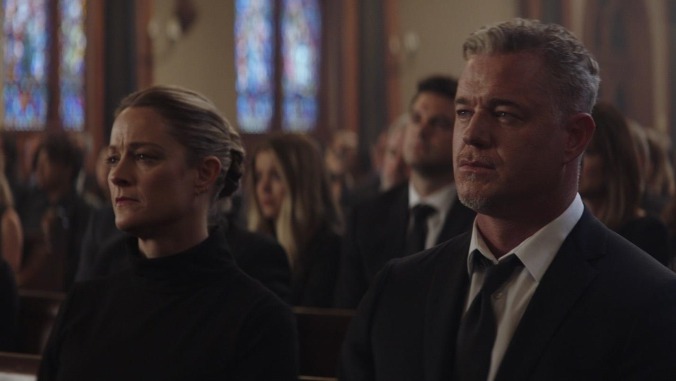The Ravine seeks easy conclusions from complicated crimes
Writer-director Keoni Waxman's tragic drama forsakes nuance in favor of preachy solutions

The horrible reality of random acts of violence is that people are often denied the kinds of closure that they expect and feel that they deserve. The world can be impartially and nonsensically cruel, and the feelings of grief and heartache that result from life’s hardest turns can be devastating, as much for their incomprehensibility as their tangible effects on our lives. At first glance, this is how The Ravine’s writer-director Keoni Waxman (adapting a novel of the same name by Robert Pascuzzi) appears to approach an unspeakable tragedy, leaning into the mysterious nature of people’s hearts to transform a domestic family existence into a staging ground for bloodshed.
Yet as the film slowly and methodically reveals its Christian faith-based intentions, it becomes clear that emotional nuance is a secondary concern to the belief that God’s love holds all answers. Regardless of your religious persuasion, the results are just that much less interesting.
The tragedy in question revolves around the shocking murder of a wife (Rachel, played by Cynthia Evans) and son by their apparently loving father, Danny (Peter Facinelli), before he drives his car into a ravine and shoots himself in the head on the way down. The murder-suicide is first contextualized by the news being imparted to Danny’s brother Tony (Kyle Lowder), but it’s Danny and Rachel’s best friends Mitch (Eric Dane) and Carolyn (Teri Polo) whose lives are thrown into limbo as they struggle with the lack of answers available to them. In particular, this pushes Mitch to conduct his own investigations into Danny’s actions, trying to figure out exactly why Danny would suddenly succumb to murderous impulse.
Grappling with the question of why a seemingly normal guy might murder his family isn’t unreasonable to explore, and it creates some interesting dramatic tension as Mitch tries to make sense of one of his closest friend’s final moments of monstrosity, pushing Carolyn away as her attempts to manage her own pain place explanation at a lower priority. The Ravine muddies the waters pretty substantially by parsing out information about the murders as it explores questions as to why, while procedural explanations are withheld artificially to build intrigue that doesn’t exist. Not only does a police detective (Byron Mann) dole out tidbits of information to Mitch for no adequately explored reason beyond plot expediency, but he does so at increments that force the film to reiterate the timeline of events so often that it quickly becomes redundant.
Interspersed are flashbacks to Danny’s past that illuminate a criminal history unknown to Mitch and Carolyn. These are rather perplexingly delivered with voiceover monologue by brother Tony, grinding the film’s minimal momentum to a dead halt in order. This pursuit of backstory distracts from the incomplete picture of the night in question and comes unprompted at the point in the present narrative where Tony shares this information. A clumsy narrative device allows us to see how Danny and Tony (whose younger versions are played by Kelby Roberson and Sam Evans, respectively) served time in prison for a burglary gone wrong, hinting that Danny has always had the potential for violence. But these scenes are so drawn out that they feel like a Wikipedia entry informed the biopic of a fictional character. The sequences might have made more sense if the order of operations adequately presented how the crime occurred before grappling with the more complex questions of why, but that would detract from the intentions that underlie The Ravine’s climax.
Enter Joanna (Leslie Uggams), who lurks around the periphery of the film for the majority of the runtime, hinting at some divine purpose without directly interacting with Carolyn’s grief or Mitch’s investigation. That is, until we are given a rather unceremonious flashback to Joanna’s childhood, in which she watched her father’s soul ascend to heaven, revealing a connection to God that gives her a second sight. Joanna’s utility in the plot is to provide third-act insight as to why Danny did what he did.
Not only does Joanna’s character emblemize a patronizing trope as the film’s only named Black character, existing solely to further the spiritual lives of its white protagonists by supernatural means, but this turn all but robs Carolyn and Mitch the pathos of completing their character arcs. Carolyn seeks medical assistance off-screen, but Joanna’s magical presence dissuades her from taking her medication in a rather insidious dismissal of the potential help anti-depressants may provide. Mitch, meanwhile, finally pieces together a complete timeline of the night’s events, only to have it re-explained to him through a filter of divine intervention. Both characters completely sidestep a complex journey of growth and finding peace in the face of nihilism, only to be left with the simplistic revelation that God works in mysterious ways.
If The Ravine were more upfront about its intentions to play into the tropes of pop Christianity—or if it at least had a more coherently constructed screenplay that doesn’t artificially contrive mystery to push the plot forward—the film could get away with providing a simplistic answer to a complex emotional quandary. Instead, The Ravine spends more than an hour telegraphing that this is a story about the perplexing feelings that arise from a close friend’s dark and sudden turn. Then it swiftly brushes aside those layers in favor of a mystically clean explanation, and the result is narratively dull, emotionally ungratifying, and intellectually insulting.